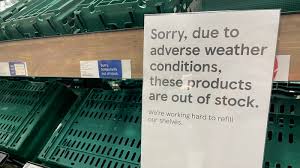Extreme weather patterns associated with climate change are wreaking havoc on food production, leading to shortages and price hikes in the UK and abroad.
Record rainfall has prevented farmers across the UK from planting crucial crops like potatoes, wheat, and vegetables, resulting in poor-quality yields and significant losses. The incessant wet weather has also increased mortality rates among lambs and reduced milk production from dairy cows.
As a result, the UK is expected to rely more heavily on imports. However, similar weather challenges in European countries like France and Germany, coupled with drought in Morocco, may limit the availability of imported food. Economists warn that this could drive up food prices in supermarkets, exacerbating financial strain for consumers.
The National Farmers’ Union reports that markets have suffered due to the challenging conditions, with farmers struggling to meet demand. Wholesale prices for potatoes have surged by 60% compared to the previous year, as a substantial portion of the crop has been lost.
Additionally, reduced planting of potatoes and other crops due to weather uncertainties and financial concerns further exacerbates the situation. Farmers are grappling with high costs and low profitability, raising concerns about the sustainability of current agricultural practices.
The impact extends beyond potatoes, affecting crops like carrots and parsnips due to waterlogged soils. Some farmers have abandoned planting altogether or switched to alternative crops, potentially leading to shortages of essential food items in the future.
Similar challenges are observed in Europe, with France and Morocco facing adverse weather conditions that hinder crop production. This underscores the global nature of the issue and the urgent need for climate action to mitigate future disruptions to food supply chains.
Experts emphasize the need for immediate efforts to reduce emissions and transform food systems to ensure resilience in the face of climate change. This includes reducing meat consumption and promoting plant-based diets as part of a comprehensive strategy to safeguard food security for the future.


















